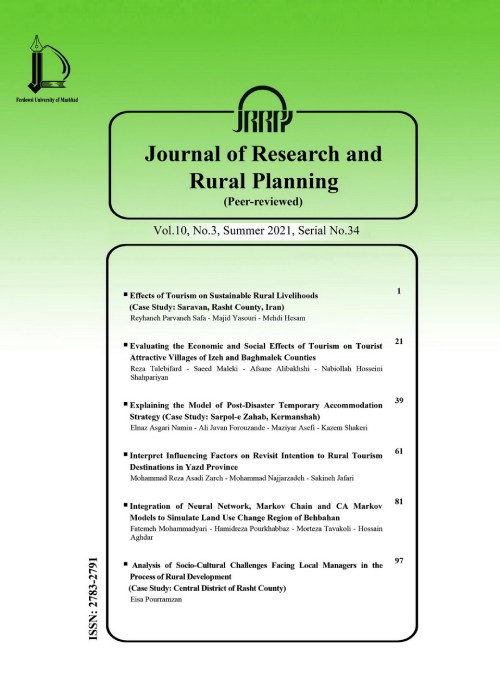A Q Methodology-Based Analysis of Expert's Attitudes towards Obstacles and Challenges of Irrigation Management Transfer to Farmers
Author(s):
Abstract:
Purpose
Using Q-methodology approach, this study attempts to examine the attitudes of experts towards the barriers and challenges of irrigation management transfer.Methods
In terms of purpose and research methodology, this study is applied and mixed-method (quantitative-qualitative), respectively. To identify the challenges of irrigation management transfer, Q methodology was used. In the first phase, a questionnaire containing two questions about the barriers and challenges to irrigation management transfer were administered to experts and managers of two organizations involved in agricultural water management. After collecting their views and reviewing internal and external resources, 41 items were derived. In the second phase, 30 participants including 20 managers and experts from Guilan Jihad-Agriculture Organization and Guilan Regional Water Authority, as well as 10 faculty members from Departments of Water, Development and Rural Planning in universities of Guilan and Kharazmy were studied. The participants were selected using purposive sampling method.Findings: Based on the results, a group of experts with the majority of faculty members believed that organizational and cultural barriers were the most important obstacles to the realization of participatory irrigation management. The second group including executive experts with the majority of Guilan Jihad-Agriculture Organization members mentioned that technical and administrative obstacles had more prominent role than cultural and institutional barriers. Finally, from the perspective of the third group that was relatively smaller than the other two groups, the major challenge in non-realization of participatory irrigation management was rooted in cultural-educational issues.
Limitations: Because this study was conducted in the first half of the year characterized with the peak agricultural activity, access to key managers and experts of Guilan Regional Water Authority was very difficult and time consuming.
Practical implications: Codification of clear and practical guidelines enjoying impressive views of the three groups of stakeholders (Ministry of Energy, Ministry of Jihad-Agriculture and academia) in the field of enforcement mechanisms, consulting, regulatory, determination of duties according to the executive, advisory and monitoring position, and avoiding frequent changes in executive agencies responsible for participatory irrigation management can be helpful in this regard.
Authenticity: To date, several important studies have been conducted in this area, each one being an appropriate guide by itself. Distinguished feature of this study is that it looked at this issue from another perspective and tried to study the problem in a distinct way (Q-methodology) from the point of view of different groups involved to compare the differences of views and to drive distinguished components of the three groups standpoints (based on the career status of the respondents).
Language:
Persian
Published:
Journal of Research and Rural Planning, Volume:6 Issue: 1, 2017
Pages:
205 to 222
magiran.com/p1701034
دانلود و مطالعه متن این مقاله با یکی از روشهای زیر امکان پذیر است:
اشتراک شخصی
با عضویت و پرداخت آنلاین حق اشتراک یکساله به مبلغ 1,390,000ريال میتوانید 70 عنوان مطلب دانلود کنید!
اشتراک سازمانی
به کتابخانه دانشگاه یا محل کار خود پیشنهاد کنید تا اشتراک سازمانی این پایگاه را برای دسترسی نامحدود همه کاربران به متن مطالب تهیه نمایند!
توجه!
- حق عضویت دریافتی صرف حمایت از نشریات عضو و نگهداری، تکمیل و توسعه مگیران میشود.
- پرداخت حق اشتراک و دانلود مقالات اجازه بازنشر آن در سایر رسانههای چاپی و دیجیتال را به کاربر نمیدهد.
In order to view content subscription is required
Personal subscription
Subscribe magiran.com for 70 € euros via PayPal and download 70 articles during a year.
Organization subscription
Please contact us to subscribe your university or library for unlimited access!



